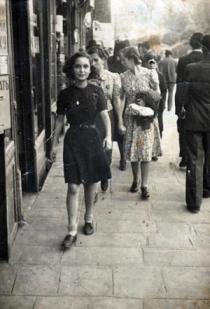This is a picture of the two best friends I had when I was a university student in 1950. When my mom left for Israel I shared a room with Ester Alkalai. On the right is Maria Zaharieva and on the left is Ester Alkalai. I am in the middle. Maria and her parents used to help me a lot when I was all alone. We studied chemistry together in the university. Maria is a Bulgarian. Stela (Ester) lives in Israel now. She was the first chemistry expert who got involved with restoration work. She worked in the national library ‘St. St. Cyril and Methodius’. Together with a mechanic engineer she invented a special kind of machine, which helps in the process of restoration.
My mother and brother went to Israel with Maer (my mother’s second husband) and his son in 1949. At first, they lived in poverty in bungalows. When they left, I had already met my husband. I married him a couple of months later. There was a tradition for the parents to make sure if their children were going to marry a decent person, so they investigated their children's future husbands or wives and their families. I remember my mother told me once that there was a nice boy who liked me and that she had already checked his family. She said it was a decent one. I married that boy in the same year 1949, soon after my mother had left for Israel.
My husband, Isak Ninyo, and I had a civil marriage. Our wedding was a humble one with a couple of friends as guests. We lived in the same house with his parents Lenka and Yako for 28 years. My mother-in-law was a very intelligent person and we got along very well. She played a big part in our development as individuals.
When we got married I was studying chemistry in the university and I was in my third year. My husband was attending the evening technical high school. I received no support from my relatives. At that time, my husband didn't have a job. But my mother-in-law was an amazing woman. She could always give advice and she could point out the best solution for any problem. There were special courses which were very popular at that time, they were called 'rabfak' [workers’ academy] and they were professional courses taught at high school. My husband graduated from one of those courses and that was how he received a high school certificate. After that he went on studying electrical engineering at the Institute of Machine Electrical Engineering. At first, it was difficult for him to study because he didn't have a good basic knowledge from the high school. Therefore, he had to catch up a lot. He had a small scholarship from the Jewish community. It was 200 Bulgarian levs and it was granted only to Jewish students. He also received a special bag and a pair of Richter compasses, because he studied a technical science. I didn't have a job because I was still at the university. The only person from the family to work was my father-in-law. He was a barber. My mother-in-law had had a job before 9th September [1944], when she was a tailor.
When I got my degree from the university I had already given birth to my son. It was hard time at home because my husband hadn't finished his studies yet and all of us were dependent on the money that my father-in-law could earn. Every month my mother sent me a small allowance from Israel.
I have been a little bit superstitious ever since I was young, because there were many lovely things that happened to me. I am an optimist and believe that everything will be just fine at the end. I think there is a power that rules everyone's fate. For instance, when I first started looking for a job I relied mainly on the acquaintances I had. There was no success at the beginning. One day, by accident, I met a classmate from the school in Kyustendil. She worked at the human resources department of a Center for ceramics and porcelain research. She told me she could offer me a job there. There was a laboratory so I took the position of a chemist. My task was to make researches in ceramics. At first, my contract was for a limited period because I was supposed to take the place of a person who went abroad for a while. But he didn't come back so I took his place permanently. Later, he decided to return and I was forced to leave. His experience was considered grater than mine because he had worked abroad. Just by a lucky coincidence, one colleague of my husband helped me, so I got the job again after a while.
After 9th September 1944 [the day of the communist takeover in Bulgaria] I have never had any problems related to my origin, despite the fact I was the only Jew in the lab. Everybody there did his job well and there was no reason for conflicts.























